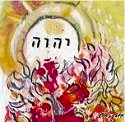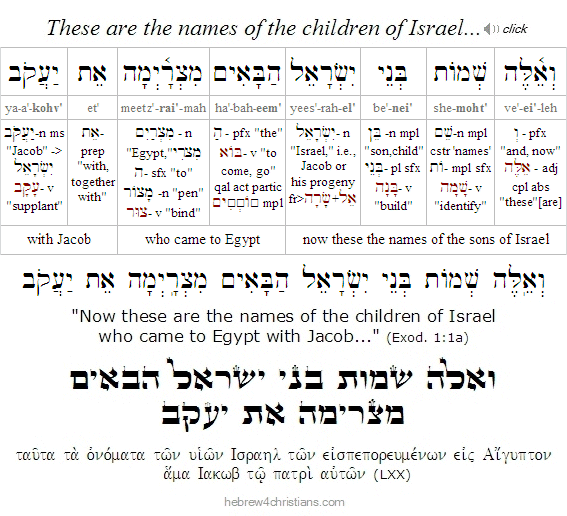|
This week's Torah portion (the very first of the Book of Exodus) is called Shemot (שְׁמוֹת, "names") because it begins with a list of the "names" of the sons of Jacob who came to dwell in the land of Goshen: וְאֵלֶּה שְׁמוֹת בְּנֵי יִשְׂרָאֵל הַבָּאִים מִצְרָיְמָה / "These are the names of the sons of Israel who came to Egypt with Jacob" (Exod. 1:1). Now while it is true that the Scriptures go on to list the names of Jacob's descendants, this portion more importantly refers the Names of the LORD God of Israel Himself. "These are the names..."
Hebrew Lesson
Exodus 1:1a Hebrew reading (click):
To see this, let's consider the central story of our reading, namely, the commissioning of Moses at the Burning Bush (see Exod. 3:1-20). Note that the Torah states that it was the Angel of the LORD (i.e., Malakh Adonai: מַלְאַךְ יהוה) who appeared to Moses בְּלַבַּת־אֵשׁ מִתּוֹךְ הַסְּנֶה / "in a flame of fire out of the midst of a bush" (Exod. 3:1-2). But then the Torah goes on to say that the LORD (יהוה) saw Moses drawing near to the bush while God (i.e., Elohim: אֱלהִים) called out to him. God (i.e., Elohim) then commanded Moses to remove his sandals and identified Himself as the "God of Abraham (i.e., Elohei Avraham: אֱלהֵי אַבְרָהָם), the God of Isaac (i.e., Elohei Yitzchak: אֱלהֵי יִצְחָק), and the God of Jacob (i.e., Elohei Ya'akov: אֱלהֵי יעֲקב)." In this short and dramatic account we have several Names of God presented - the Angel of the LORD, the LORD, God (Elohim), and the "God of Abraham, the God of Isaac, and the God of Jacob" - all of which refer to the One true God!
When God commissioned Moses to be His shaliach (שָלִיחַ) - His emissary - to go before Pharaoh and lead the children of Israel back to the Promised Land, he objected that he was unfit for the task. He protested that he was kevad peh - "heavy of mouth" and kevad lashon, "heavy of tongue," and therefore unable to speak on behalf of the LORD (Exod. 4:10). God reminded him that He was the Creator of the mouth: "Who makes him mute, or deaf, or seeing, or blind? Is it not I, the LORD?" (Exod. 4:11).
Perhaps it was because Moses was "heavy of mouth" that he continued to object to God's plan. After all, what would Moses say if he were asked what God's Name was? Perhaps Moses couldn't speak well enough to properly enunciate the Divine Name? It is revealing to understand the LORD's reply: אֶהְיֶה אֲשֶׁר אֶהְיֶה / "Ehyeh Asher Ehyeh ('I will be what I will be'); and He said, "Say this to the people of Israel, 'I AM (אֶהְיֶה) has sent me to you.'" Then God (i.e., אֱלהִים) went on to "spell it out" for Moses: "Say this to the people of Israel, 'The LORD (יהוה), [namely] the God of your fathers, [namely] the God of Abraham (אֱלהֵי אַבְרָהָם), [namely] the God of Isaac (אֱלהֵי יִצְחָק), and [namely] the God of Jacob (אֱלהֵי יעֲקב), has sent me to you.' This is my name forever (זֶה־שְּׁמִי לְעלָם), and thus I am to be remembered throughout all generations" (Exod. 3:14-15).
Now I included the Hebrew text here to make it explicit that the distinct Names of God in this passage (i.e., יהוה, אֱלהִים, מַלְאַךְ יהוה, and so on) all refer to the One true LORD God of Israel, Maker of Heaven and earth. Indeed, the Torah makes it clear that the Name of the LORD YHVH (יהוה) is associated with the phrase ehyeh asher ehyeh (rendered as "I AM THAT I AM" in the KJV), which derives from the Qal imperfect first person form of this verb hayah (הָיָה): "I will be." In other words, there is a direct connection between the Name YHVH and Being and Reality itself. YHVH is the Source of all being and has being inherent in Himself (i.e., He is necessary Being). Everything else is contingent being that derives existence from Him. The name YHVH also bespeaks the utter transcendence of God. In Himself, God is beyond all "predications" or attributes of language: He is the Source and Foundation of all possibility of utterance and thus is beyond all definite descriptions. Hence the LORD is sometimes simply called HaShem, "the Name," since no amount of verbiage will ever do justice to the infinite majesty and truth of His Life...
People who argue about the name of God miss the point... As I've said before, God is "Presence" (Exod. 3:13-14), "Breath" (Gen. 2:7; Num. 16:22), "Life" (Deut. 30:20), "Love" (Exod. 34:6-7), and the "I-AM-WITH-YOU One" who keeps His promises. The Name YHVH (יהוה) means that "God was (i.e., hayah: היה), God is (i.e., hoveh: הוֶה), and God always will be (i.e., veyihyeh: וְיִהְיֶה)," which implies that He is ever present and not restricted by time or space. Moreover, God is called havayah (הֲוָיָה), which means He sustains creation by the Word of His power: "In Him we live, move, and have our being" (Acts 17:28; Heb. 1:3).
Note: For more, see "Shemot: Divine Names Theology" and "Using the Name in Vain."
Quick Addendum:
The Name of God is not unimportant, of course, but involves a complex constellation of interrelated ideas and revelation about the character and deeds of the God of Israel. God's Name represents his power, his character, and his loving actions in the universe. For the purposes of our discussion here, however, the question about "the" Name of God must first of all be understood as a matter of interpretation of Torah and the Jewish Scriptures.
|



